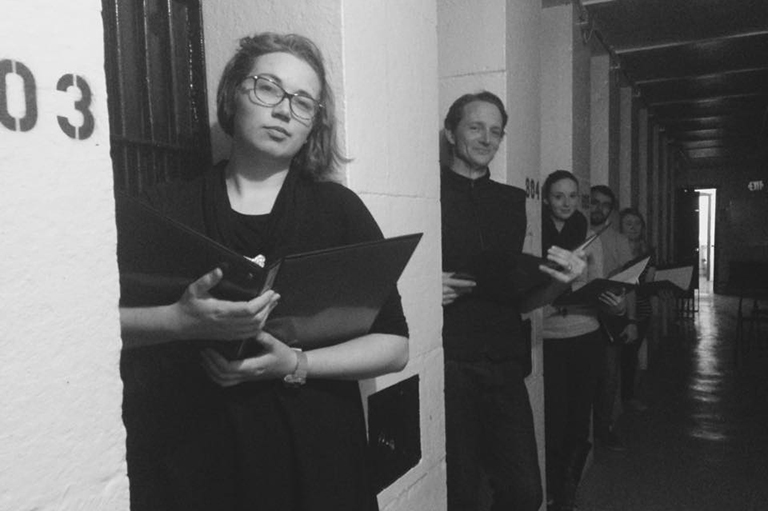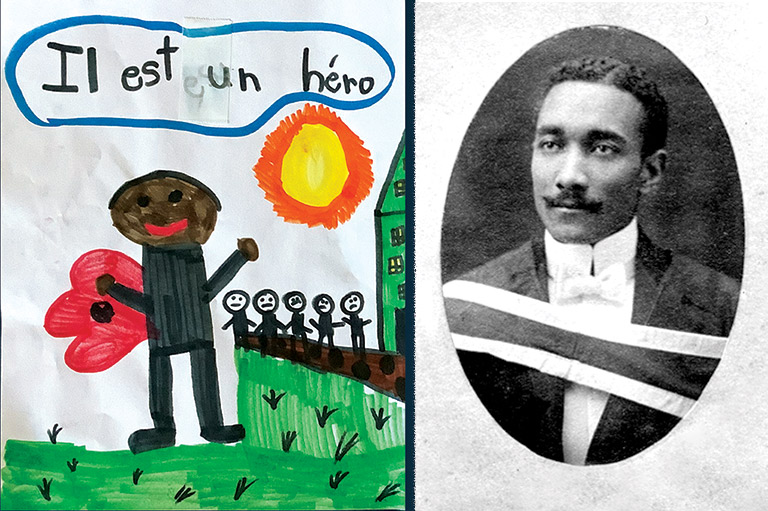Encountering Maria

Emily: I’m trying to help you!
Maria: How!
Emily: By — By giving you a voice, by letting you be more than what these people wrote about you!
Maria: What if I don’t want a voice? What if I just want to be left alone! People hearing this isn’t going to change anything.
Emily: I can’t believe that. I won’t! Don’t you want to be more than just a person that was here (gesturing around her)? More than just a name in a book, in an archive. Written by someone who didn’t care who you were. I care.
This excerpt lies at the heart of what I set out to explore in my graduate major research essay for the Public History Program at Carleton University. Through the creation of a script, I was able to explore the influence (re)creating and performing history had on a theatre company’s acting and creative team, as well as the complex issue of authorial presence in history making.
To do this, I created a script that tells two stories. The first is the story of Maria Spearman, who one evening in August of 1882 set out with her brother Chester to meet and speak with Robert McCaffrey. The conversation revealed that Robert was the father of Maria’s unborn child, and that Chester expected him to marry her. When he refused, there was a physical altercation and a gun went off leaving Robert dead. The script is a reimagining of this story, and how it affected Maria’s life. The second storyline in the play is the story of writing the script, featuring characters modelled after people integral to its creation, including myself. In this storyline the characters highlight the performances historians engage in in their writing, the complexity of reimaging the past on stage, and the debt we feel to the people whose stories we are telling.
An important part of exploring these issues for me was the performance of the script. To do this I worked with The Cellar Door Project, a site-specific theatre company based in Kingston, Ontario, and Ottawa. They believe that presenting plays that are rooted and connected to the places where they are performed offers a unique opportunity to reimagine both temporal and spatial understandings of the past. For our performance The Cellar Door Project assembled a cast of actors to stage a dramatic reading of the script. Our performance venue was the Carleton County Gaol, now the HI-Ottawa Jail Hostel, where Maria and Chester were imprisoned before their trial.
Over the course of our rehearsals I witnessed how the production team intervened and manipulated the version of the past they performed. This most commonly took the form of posing and prompting questions of me, the historian and playwright. For example, the script opens with the events immediately preceding the shooting of Robert McCaffrey. Most of the dialogue for this scene is taken verbatim from Chester Spearman’s testimony at trial. In the scene, Robert attempts to avoid taking any responsibility for Maria’s pregnancy, and responds evasively and even rudely. Chester grows increasingly agitated and eventually exits, leaving Maria and Robert to continue the conversation.
Picking up on the tension, one of the actors asked about the ages of the men. He explained, based on his reading, that he wouldn’t be surprised if Chester was the younger of the two. He elaborated on this by drawing attention to Chester’s use of formal language, indicating that Chester may have been trying exude authority and seriousness, while also bridging the age gap between himself and Robert. Another actor speculated about the social status of both men. Robert seems particularly unconcerned with Chester and the fact he is calling out his philandering ways. The cast interpreted this as a suggestion that Robert believed he was immune to any kind of community pressure or shame.
To my surprise, their intuition was correct. Robert was around thirty-three years old when he died, while Chester was in his late twenties. Additionally, newspaper reports described McCaffrey’s family as well-respected in the township. The Spearman family comparatively was described as frequently fighting amongst themselves, and in some cases appeared before court. The actors’ reading of the script I’d written required them to invent ways of conveying emotion and motive to an audience, in this case thinking about age and class, which turned out to be historically accurate.
The script was performed three times at the HI-Ottawa Jail Hostel in February 2016 for sold out audiences. After each of our performances we held an informal talk back session. During one of these sessions, an audience member came up to me and explained that while she had been in the hostel countless times, and had always been aware of its past, she had never fully realized that people had been incarcerated there. In this case, having the actors recreate and reanimate individuals that were once imprisoned in the space made the history of the space “real” and the past come to life.
These observations and interventions by non-historians brought an emphasis to the fact that the historic individuals in this story were people who, like us, were imperfect and unpredictable. They prompted me to look beyond the historical documents they left behind, and imagine them as three-dimensional persons. Furthermore, it highlighted the fact that historians like myself are performers. Like actors, we intervene and manipulate the story we tell. No amount of theoretical and objective language can erase our authorial mark. Facing my fears that I was not only misinterpreting the past, but misusing it for my own gain, enriched my work. The title of the script — “I Was Here” — acknowledges Maria’s presence and, of course, mine.
Listen to the above excerpt
We hope you’ll help us continue to share fascinating stories about Canada’s past by making a donation to Canada’s History Society today.
We highlight our nation’s diverse past by telling stories that illuminate the people, places, and events that unite us as Canadians, and by making those stories accessible to everyone through our free online content.
We are a registered charity that depends on contributions from readers like you to share inspiring and informative stories with students and citizens of all ages — award-winning stories written by Canada’s top historians, authors, journalists, and history enthusiasts.
Any amount helps, or better yet, start a monthly donation today. Your support makes all the difference. Thank you!
Themes associated with this article
Advertisement
With 7 uniquely curated newsletters to choose from, we have something for everyone.




